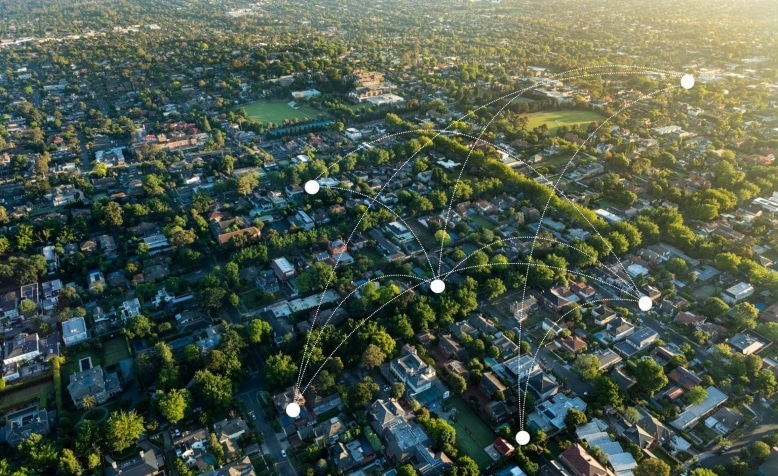Broadband Office Name: Arizona Commerce Authority (ACA)
BEAD Award Amount: $993.1 M
Arizona Broadband Director: Sandip Bhowmick
Arizona BEAD Program Tracker
| State | IP Vol 1 Approval | IP Vol 2 Approval | Challenge Process Submission Closed | Challenge Process Final Determination Phase Completed | 1-Year Subgrantee Selection Process |
|---|---|---|---|---|---|
| Arizona | Yes | No | Yes | Yes | N/A |
Arizona BEAD Program Information

Key Updates
The Arizona Commerce Authority’s (ACA) Final Determination stage of the Challenge Process ran until June 30th. The Final Determination results will be reviewed and approved by the NTIA.
Once NTIA approves ACA’s Initial Proposal Volume 2, it will be able to begin the Subgrantee Selection Process.
Arizona BEAD Program Plans & Maps
Arizona BEAD Program Initial Proposal Volume 2: Overview
*Information is subject to change. Arizona is awaiting official approval of Initial Proposal Volume 2 from the NTIA.
BEAD Long-Term Objectives
The FCC Broadband Map shows that around 12.2% of households in Arizona do not have access to a wireline or licensed fixed wireless connection of 100/20 Mbps. To address this, the Arizona Commerce Authority (ACA) has established the following objectives for BEAD Deployment:
- Broadband Deployment:
- Identify areas that do not meet 100/20 Mbps.
- Execute a data-driven grant program that invests in new broadband infrastructure to meet minimum broadband standards.
- Closing the Digital Divide:
- Strengthen partnerships with stakeholders.
- Promote digital inclusion and ensure Arizonans have the necessary resources.
- Maintain a Digital Equity Asset Inventory.
- Integrate broadband infrastructure investments.
- Leverage funding programs and investments.
- Addressing Access, Affordability, and Adoption Issues:
- Promote programs like the Affordable Connectivity Program (ACP) and other affordable plans.
- Encourage competition in the market.
- Enhancing Economic Growth and Job Creation:
- Ensure a 21st-century-ready workforce by utilizing the Arizona Commerce Authority’s business development expertise and the Office of Economic Opportunity to create technology development programs.
- Coordinate with Arizona institutions of higher education to develop programs for all levels of schooling.
- Collaborate with agencies to create programs that provide reskilling and upskilling opportunities for individuals.
Arizona BEAD Program Project Area Design
The state will create project areas and take in stakeholder feedback. Attributes considered will include census blocks, governmental unit boundaries such as counties, geography and terrain, competitive landscape, and available backbone infrastructure.
All proposed projects will be scored for cost reasonableness, which involves assessing the project costs against a benchmark for the project area. Projects significantly above the benchmark value will be assessed as part of a second round of applications (deferred applications) to ensure adequate funding is available to serve all unserved and underserved locations, followed by eligible Community Anchor Institutions (CAIs).
Arizona BEAD Program Extremely High Cost Threshold
The Extremely High Cost Per Location Threshold (EHC) will not be set until Round 1 applications have been received. It will be based on an analysis of the funding requirements for actual subgrant proposals received. The process to determine the EHCPLT will involve using cost models that consider both the capital expenditures and the operational costs for the lifespan of the network.
BEAD Deployment Subgrantee Selection
ACA is asking for the following preregistration evidence from subgrantees and compliance with: Financial capability, managerial capability, operational capability, technical capability, ownership info, public funding info, compliance with laws, cybersecurity/supply chain compliance, and BABA/EHP/NEPA/NHPA compliance.
Primary Scoring Criteria for Priority Broadband Projects
- 50% – Minimal BEAD Outlay
- 18% – Affordability
- 7% – Fair Labor Practices
Secondary Scoring Criteria
- 2% – Speed to Deployment
- 12% – Technological Requirements
- 4% – Local and Tribal Coordination
- 2% – Community Anchor Institutions
- 5% – Equitable Workforce Development and Job Quality
Other Last-Mile Projects
Primary Scoring Criteria for Non-Priority Broadband Projects
- 50% – Minimal BEAD Outlay
- 18% – Affordability
- 7% – Fair Labor Practices
Secondary Scoring Criteria
- 2% – Speed to Deployment
- 12% – Technological Requirements
- 4% – Local and Tribal Coordination
- 2% – Community Anchor Institutions
- 5% – Equitable Workforce Development and Job Quality
BEAD Non-Deployment Subgrantee Selection
The preliminary analysis shows insufficient funding to cover deployment activities to achieve universal coverage. As a result, the Arizona Broadband Office will not award subgrants for any non-deployment activities.
BEAD Eligible Entity Implementation
ACA has extensive experience in managing broadband projects and grant programs, as indicated by the following initiatives:
- Arizona Middle-Mile Program
- Arizona Broadband Development Grant (ABDG) Program
- Rural Broadband Development Grant (RBDG)
- Development and Publication of a Public State Broadband Map
- Technical Assistance
- Implementation of the Challenge Process
- Subgrantee Selection Process Implementation
- Workforce Development in Broadband Deployment
- Administrative Tasks for Grant Management of Subgrantees
BEAD Local, Tribe, and Regional Broadband Planning Process
Governor Hobbs Forms Broadband Advisory Council
Governor Hobbs formed the Interagency and Community Broadband Advisory Council to support strategic planning for broadband deployment. The CEO and President of the Arizona Commerce Authority will serve as Chair of the council.
Stakeholder Engagement and Information Gathering
The Arizona Broadband Office, through local government roundtables and surveys, gathered information about policies, plans, and assets that support BEAD implementation. Between July and October 2023, the Arizona Broadband Office conducted an online survey of local governments across the state to gather insights about the Digital Divide from a local government perspective, the steps agencies are taking to address these issues, and the challenges communities face in improving broadband services for residents.
Workshops and Community Feedback
The Arizona Broadband Office planned workshops with key partners, such as the League of Arizona Cities and Towns and the County Supervisors Association, to introduce the BEAD program. The stakeholder engagement process was developed to align with the requirements of the Digital Equity Act and to hear from the community about their digital needs.
BEAD Labor Standards & Protection
ACA requires all BEAD subgrantees to submit the following information:
A record of past compliance with federal/employment laws:
- Must address info on deployment projects within the last 3 years.
- Certification form from an Officer/Director level employee of past compliance.
- Written confirmation that subgrantee has disclosed any violations from contractors within the last 3 years.
- Discussion of workforce plan
Plans for ensuring compliance with federal/employment laws:
- How subgrantee will ensure compliance in its labor/employment practices.
- Info on applicable wage scales, wage, and overtime practices for each class of employee expected to be involved in physical construction of the network.
- How subgrantee will ensure implementation of workplace safety committees.
- Comply with the Prevailing Wages Act.
- Other items as outlined in the BEAD NOFO.
BEAD Minority Business Enterprises / Women’s Business Enterprises / Labor Surplus Area Firms Inclusion
ACA will adopt affirmative steps to ensure that Minority and Women Business Enterprises (MWBE) suppliers play a meaningful role in broadband deployment:
- Solicitation and Collaboration:
- Place qualified small and MWBE businesses on solicitation lists.
- Collaborate with MWBE stakeholders.
- Promote diversity and inclusion in the procurement process.
- Data Utilization and Task Division:
- Leverage data to identify opportunities for MWBE participation.
- Divide total requirements into smaller tasks when economically feasible to facilitate MWBE involvement.
- Delivery Schedule and Stakeholder Insights:
- Establish a delivery schedule that promotes MWBE participation.
- Collaborate with MWBE groups to gather insights from industry stakeholders.
- Subgrantee Requirements:
- Mandate that subgrantees take affirmative steps to promote diversity and inclusion in their procurement processes.
BEAD Cost & Barrier Reduction
1. Promoting the use of existing infrastructure.
2. Promoting and adapting dig-once policies.
3. Streamlining permitting processes.
4. Streamlining cost-effective access to poles, conduits, and easements.
5. Streamlining rights of way, including the imposition of reasonable access requirements.
BEAD Low-Cost Broadband Service Option
Subgrantees receiving BEAD funds must adhere to the following requirements:
- ACP Participation:
- Must participate in the Affordable Connectivity Program (ACP).
- Low-Cost Broadband Service:
- Must offer at least one low-cost broadband service option for all BEAD-funded projects.
- Pricing:
- $30 per month or less, inclusive of all taxes, fees, and charges, if the subscriber does not reside on Tribal Lands, with no additional non-recurring costs or fees to the consumer.
- $75 per month or less, inclusive of all taxes, fees, and charges, if the subscriber resides on Tribal Lands, with no additional non-recurring costs or fees to the consumer.
- Develop a marketing plan to improve knowledge of the availability of low-cost broadband options and subsidy programs.
- Implement broadband consumer labels.
- Participate in the Lifeline Program.
- Provide a minimum service bandwidth of 100/20 Mbps.
- Ensure typical latency measures no more than 100 milliseconds.
- Not subject to data caps, surcharges, or usage-based throttling.
- Service must be installed within 10 calendar days of request.
BEAD Middle-Class Affordability
ACA defines middle-class affordable service options as follows:
- Priority Projects:
- High-speed service of at least 1 Gbps.
- Latency measurement of no more than 100 milliseconds.
- Non-Priority Projects:
- Speeds of 100/20 Mbps.
- Latency measurement of no more than 100 milliseconds.
- Upgrade Provision:
- If the provider offers a new middle-class option later, eligible subscribers can upgrade at no cost.
- Compliance:
- Must comply with the Arizona Consumer Protection Act.
Affordability Pricing Standard: The average monthly internet bill in Arizona is $76.23, and the median income in 2022 was $73,450.
- Pricing for Priority Projects:
- Total package cost of $75 per month or less, inclusive of all taxes, fees, and charges for 1 Gbps service.
- Pricing for Non-Priority Projects:
- Total package cost of $55 per month or less, inclusive of all taxes, fees, and charges for 100/20 Mbps service.
Additional Points:
- Arizona will award additional points to applicants that include a marketing plan to raise awareness of these subsidy programs.

